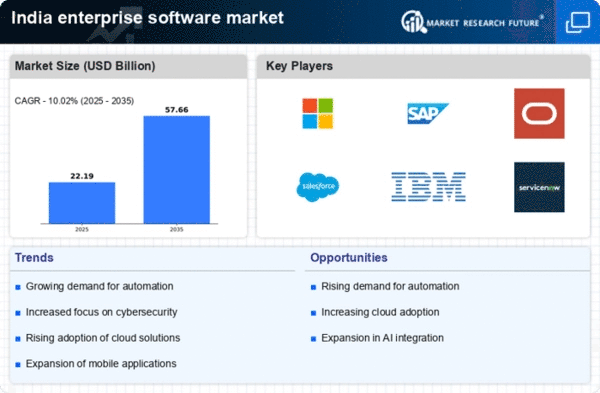Rising Demand for Automation Solutions
The enterprise software market in India is experiencing a notable surge in demand for automation solutions. Organizations are increasingly recognizing the potential of automation to enhance operational efficiency and reduce costs. According to recent data, the automation software segment is projected to grow at a CAGR of approximately 25% over the next five years. This growth is driven by the need for businesses to streamline processes, minimize human error, and improve productivity. As companies seek to remain competitive, the adoption of automation tools is becoming a strategic priority. This trend is likely to continue, as enterprises invest in software that can automate routine tasks, thereby allowing employees to focus on more strategic initiatives. Consequently, the enterprise software market is poised for significant expansion as automation becomes integral to business operations.
Increased Focus on Remote Work Solutions
The shift towards remote work has fundamentally altered the landscape of the enterprise software market in India. Organizations are now prioritizing solutions that facilitate remote collaboration and communication. This shift is reflected in the growing demand for cloud-based software, which allows employees to access tools and resources from anywhere. Recent statistics indicate that the market for remote work software is expected to grow by over 30% in the coming years. Companies are investing in platforms that support virtual meetings, project management, and team collaboration, thereby enhancing productivity in a remote work environment. This trend suggests that the enterprise software market will continue to evolve, with a strong emphasis on solutions that cater to the needs of a distributed workforce.
Growing Importance of Data Privacy Regulations
The enterprise software market in India is significantly influenced by the increasing importance of data privacy regulations. With the implementation of stringent data protection laws, organizations are compelled to adopt software solutions that ensure compliance with these regulations. This has led to a heightened demand for software that incorporates robust data security features and privacy controls. As businesses navigate the complexities of data management, the need for compliant software solutions is becoming paramount. Recent reports suggest that the market for data privacy software is expected to grow by approximately 20% in the next few years. This trend underscores the critical role that compliance plays in shaping the enterprise software market, as organizations prioritize solutions that safeguard sensitive information.
Emergence of Industry-Specific Software Solutions
The enterprise software market in India is witnessing a trend towards the development of industry-specific software solutions. As businesses seek to address unique challenges within their sectors, software providers are increasingly tailoring their offerings to meet these specific needs. For instance, sectors such as healthcare, manufacturing, and retail are seeing a rise in customized software solutions designed to enhance operational efficiency and compliance. This trend is indicative of a broader shift towards specialization in the software market, with companies willing to invest in solutions that align closely with their operational requirements. The growth of industry-specific software is likely to contribute to the overall expansion of the enterprise software market, as organizations recognize the value of tailored solutions in driving business success.
Adoption of Artificial Intelligence and Machine Learning
The integration of artificial intelligence (AI) and machine learning (ML) technologies is transforming the enterprise software market in India. Organizations are increasingly leveraging AI and ML to enhance decision-making processes, automate tasks, and improve customer experiences. The market for AI-driven software solutions is projected to grow at a CAGR of around 30% over the next five years. This growth is fueled by the desire for businesses to harness data analytics and predictive modeling capabilities. As companies seek to gain a competitive edge, the adoption of AI and ML technologies is becoming a focal point in their software strategies. This trend indicates a significant shift in the enterprise software market, as organizations invest in innovative solutions that drive efficiency and innovation.
















